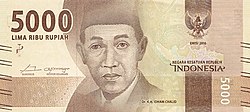Idham Chalid
Idham Chalid | |
|---|---|
 | |
| 6th Speaker of the People's Representative Council | |
| In office 1972–1977 | |
| President | Suharto |
| Preceded by | Abdul Harris Nasution |
| Succeeded by | Adam Malik |
| 3rd Chairman of the People's Consultative Assembly | |
| In office 1972–1977 | |
| President | Suharto |
| Preceded by | |
| Succeeded by | Adam Malik |
| 1st | |
| In office 6 June 1968 – 28 March 1973 | |
| President | Suharto |
| Preceded by | None |
| Succeeded by | |
| Deputy Prime Minister | |
| In office 24 March 1956 – 9 July 1959 | |
| President | Sukarno |
| Preceded by | Harsono Tjokroaminoto |
| Succeeded by | None |
| Personal details | |
| Born | 27 August 1921 Setui, Tanah Bumbu Regency, South Kalimantan, Dutch East Indies |
| Died | 11 July 2010 (aged 88) Jakarta, Indonesia |
| Political party | Nahdatul Ulama |
Idham Chalid (27 August 1921 – 11 July 2010) was an Indonesian politician and minister. Apart from being a politician, he was active in religious activities and served as the second chairman of the Nahdlatul Ulama.
Career[]
After graduating from an Islamic teaching college, Idham worked as a teacher at Islamic institutes from 1943-1945. He joined the Masyumi organization in 1944, and served in the Indonesian Navy in 1947. After working in local government, in 1950 he became a member of the People's Representative Council. After a short period as secretary general of the Nahdlatul Ulama, in 1956 he became chairman, a position he held until 1984. In March 1956, he was appointed second deputy prime minister in the Second Ali Sastroamidjojo Cabinet, and four years later became deputy chairman of the People's Consultative Assembly.[1][2][3]
Following the fall of President Sukarno, he served in the Ampera Cabinet and Revised Ampera Cabinet as minister of people's welfare from July 1966 until June 1968. He was reappointed to the First Development Cabinet as state minister for people's welfare. From 1972 to 1977, he was both speaker of the People's Representative Council and chairman of the People's Consultative Assembly.[1][2][4]
National Hero[]

Idham died in Cipete, South Jakarta on 11 July 2010 ten years after suffering a stroke. He was buried in the grounds of the Darul Qur`an Islamic Boarding School complex in Cisarua, Bogor. He was named a National Hero of Indonesia based on 113/TK/Tahun Presidential Decree No. 2011 dated 7 November 2011.[5][6]
Following the issuance of Presidential Decree No. 31 of 5 September 2016, Bank Indonesia introduced seven new banknote designs featuring national heroes. Idham Chalid's face is featured on the obverse of the Rp 5,000 banknote.[7]
Notes[]
- ^ Jump up to: a b Roeder & Mahmud 1980, p. 70.
- ^ Jump up to: a b NU online 2010a.
- ^ Simanjuntak 1980, pp. 162-163.
- ^ Simanjuntak 1980, pp. 299-325.
- ^ NU online 2010b.
- ^ Mirnawati 2012, pp. 292-293.
- ^ Kuwado 2016.
References[]
- Feith, Herbert (2008) [1962]. The Decline of Constitutional Democracy in Indonesia. Singapore: Equininox Publishing (Asia) Pte Ltd. ISBN 979-3780-45-2.
- Kuwado, Fabian Januarius (14 September 2016). "Jokowi Teken Keppres Gambar Pahlawan Nasional pada Uang Kertas dan Logam" [Jokowi Signs the Presidential Decision on Pictures of National Heroes on Banknotes and Coins]. Kompas (in Indonesian). Jakarta: Kompas Gramedia Group. Retrieved 5 August 2019.
- Mirnawati (2012). Kumpulan Pahlawan Indonesia Terlengkap [Most Complete Collection of Indonesian Heroes] (in Indonesian). Jakarta: CIF. ISBN 978-979-788-343-0.
- Ricklefs, M.C. (2008) [1981], A History of Modern Indonesia Since c. 1200 (4th ed.), Palgrave MacMillan, ISBN 978-0-230-54686-8
- NU Online (11 July 2010). "NU calls for prayers for late Idham Chalid". NU Online. Retrieved 4 August 2019.
- NU Online (13 July 2010). "Obituary: KH Idham Chalid, one of RI's best politician-cum-ulema". NU Online. Retrieved 4 August 2019.
- Roeder, P. N. H.; Mahmud, Mahiddin (1980). Who's Who in Indonesia (2nd ed.). Jakarta: Gunung Agung.
- Simanjuntak, P. N. H. (2003), Kabinet-Kabinet Republik Indonesia: Dari Awal Kemerdekaan Sampai Reformasi (in Indonesian), Jakarta: Djambatan, ISBN 979-428-499-8
- 1921 births
- 2010 deaths
- Indonesian Islamic religious leaders
- Indonesian Sunni Muslims
- Nahdlatul Ulama
- Sunni Muslim scholars
- National Heroes of Indonesia
- Speakers of the People's Consultative Assembly
